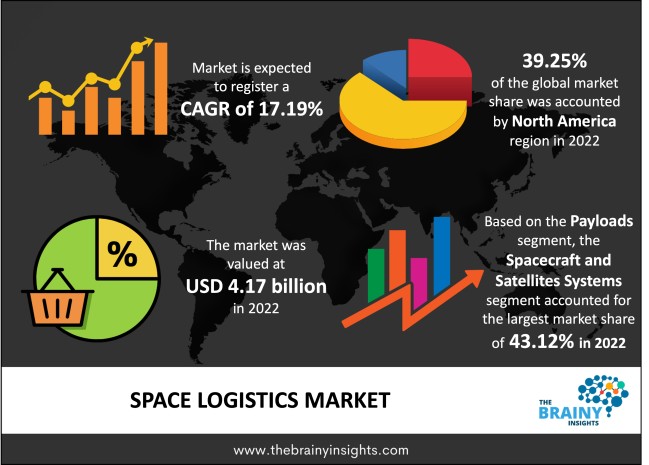Space Logistics Market: Enabling the Future of Interplanetary Trade - Market2033/Brainy_Blogs GitHub Wiki
Introduction
The global space logistics market is witnessing remarkable growth, driven by rising satellite launches, expanding commercial space activities, and increasing investments in space exploration. As technological advancements continue to reshape the industry, space logistics is emerging as a crucial segment to ensure the efficient transportation, maintenance, and operation of assets in space.

Market Values
The global space logistics market was valued at USD 4.17 billion in 2022 and is projected to grow at a CAGR of 17.19% from 2023 to 2032, reaching an estimated USD 20.38 billion by 2032, fueled by increasing government and private sector investments in space infrastructure.
Regional Analysis
North America: The United States dominates the market due to NASA’s extensive programs, private sector involvement (SpaceX, Blue Origin), and strong government funding.
- Europe: The European Space Agency (ESA) and private entities are making significant contributions to satellite servicing and deep-spacelogistics.
- Asia-Pacific: Countries like China, India, and Japan are investing heavily in satellite deployment and lunar exploration.
- Rest of the World: Emerging players in the Middle East and Latin America are expanding their presence in the space logistics domain.
Market Dynamics
Drivers:
- Growing commercial satellite deployments.
- Increased demand for on-orbit servicing and debris management.
- Advancements in AI and automation for space operations. Challenges:
- High costs associated with space missions.
- Regulatory and policy challenges.
- Space debris concerns impacting mission safety. Opportunities:
- Expansion of lunar and Mars missions.
- Growing partnerships between government and private players.
- Development of reusable space transportation systems.
Market Segmentation
- By Service Type: Satellite Servicing, Space Transportation, Cargo Logistics, Refueling, Debris Removal.
- By End-User: Government & Defense, Commercial, Space Agencies.
- By Region: North America, Europe, Asia-Pacific, Latin America, Middle East & Africa. Key Trends
- Rise of autonomous spacecraft and robotic logistics solutions.
- Expansion of in-space manufacturing and resource utilization.
- Growing investments in deep-space logistics and interplanetary missions.
- Increasing role of AI and machine learning in mission planning.
Key Players
Prominent players shaping the space logistics market include:
- Airbus Defense and Space
- Boeing
- Northrop Grumman
- Lockheed Martin
- Orbital ATK
- Blue Origin
- Space Exploration Technologies (SpaceX)
- Sierra Nevada Corporation
- Mitsubishi Heavy Industries
- Thales Alenia Space
- Honeywell International
- Dynetics
- Virgin Galactic
- Rocket Lab
- Arianespace
- RUAG Space
- NanoRacks
- Bigelow Aerospace
- Astrobotic Technology
Request to Download Sample Research Report- https://www.thebrainyinsights.com/enquiry/sample-request/13441
Conclusion
As the space industry continues its rapid expansion, the space logistics market is poised to play a pivotal role in shaping future missions. Companies and governments alike are focusing on sustainable, cost-effective, and innovative solutions to address emerging challenges and capitalize on new opportunities in space logistics. The coming years will witness increased investments, groundbreaking technologies, and strategic collaborations that will redefine the industry.